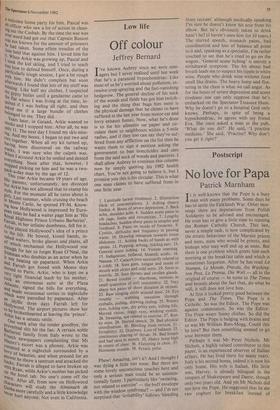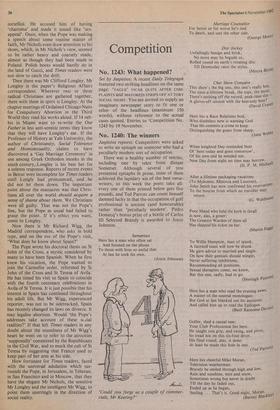Postscript
No love for Papa
Patrick Marnham
It is well-known that the Pope is a busy man with many problems. Some days he has to settle the Falklands War. Other mor- nings there are deputations from Polish Solidarity to be advised and encouraged. He even has to give a little time to running the Roman Catholic Church. This last, never a simple task, is now complicated by the erratic behaviour of the Marxist priests and nuns, nuns who would be priests, and bishops who may well end up as nuns. But there is one problem which greets him each morning at the breakfast table and which is sometimes forgotten. After he has read La Stampa, Le Monde, Pravda, the Washing- ton Post, La Prensa, Die Welt - all in the original of course - he turns to The Times and broods about the fact that, do what he will, it still does not love him. At first it looked pretty good between the Pope and The Times. The Pope is a Catholic. So was the Editor. The Pope was against communism. So was the Editor. The Pope wears funny clothes. So did the Editor. The Pope is bulging with brains and so was Mr William Rees-Mogg. Could this be love? But then something seemed to go sour between them. Perhaps it was Mr Peter Nichols. Mr Nichols, a highly valued contributor to this paper, is an experienced observer of Italian affairs. He has lived there for many years. Italy is his second home, indeed it is now his only home. His wife is Italian. His little son, Harvey, is already bilingual in the tongues of Shakespeare and Dante, though only two years old. And yet Mr Nichols did not love the Pope. He suggested that he ate raw yoghurt for breakfast instead of tortellini. He accused him of having `charisma' and made it sound like 'sex- appeal'. Once, when the Pope was making a speech about some routine matter of faith, Mr Nichols even drew attention to his shoes, which, in Mr Nichols's view, seemed to be rather heavy and coarsely made, almost as though they had been made in Poland. Polish boots would hardly do in the land of Gucci, and Times readers were not slow to catch the drift.
Then there was Mr Clifford Longley. Mr Longley is the paper's Religious Affairs correspondent. Wherever two or three radical Christians are gathered together, there with them in spirit is Longley. At the chapter meetings of Ordained Chicago Nuns for Compulsory Abortion in the Third World they read his works aloud. If 14 rab- bis in Miami want to re-write the Our Father in less anti-semitic terms they know that they will have Longley's ear. If the Professor of History at Yale University, the author of Christianity, Social Tolerance and Homosexuality, claims to have discovered a 'Gay Marriage Ceremony' in use among Greek Orthodox monks in the ninth century,iLongley is his best bet for a solemn response. Reports of recent events in Beirut were incomplete for Times readers until Longly had pronounced, and he did not let them down. The important point about the massacres was that Chris- tians all over the world should acquire a sense of shame about them. We Christians were all guilty. That was not the Pope's line, but the Pope as usual had failed to grasp the point. If it's ethics you want, come to Longley.
Now there is Mr Richard Wigg, the Madrid correspondent, who asks in bold type, and on the eve of the Pope's visit, `What does he know about Spain?'
The Pope wrote his doctoral thesis on St John of the Cross, a mystic considered by many to have been Spanish. When he first knew his vocation, the Pope wanted to join the Carmelite order, reformed by St John of the Cross and St Teresa of Avila. He has timed his visit to Spain to coincide with the fourth centenary celebrations in Avila of St Teresa. It is just possible that his interest in Spain has continued throughout his adult life. But Mr Wigg, experienced reporter, was not to be sidetracked, Spain has recently changed its laws on divorce. It may legalise abortion. Would 'the Pope's addresses take account of these social realities?' If that left Times readers in any doubt about the soundness of Mr Wigg's heart he went on to refer to the atrocities `supposedly' committed by the Republicans in the Civil War, and to mock the cult of St Teresa by suggesting that Franco used to keep part of her arm at his side.
How fortunate for Times readers, faced with the universal adulation which sur- rounds the Pope, in Jerusalem, in Teheran, in San Francisco and in Moscow, that they have the elegant Mr Nichols, the sensitive Mr Longley and the intelligent Mr Wigg, to point them unerringly in the direction of social reality.















































 Previous page
Previous page